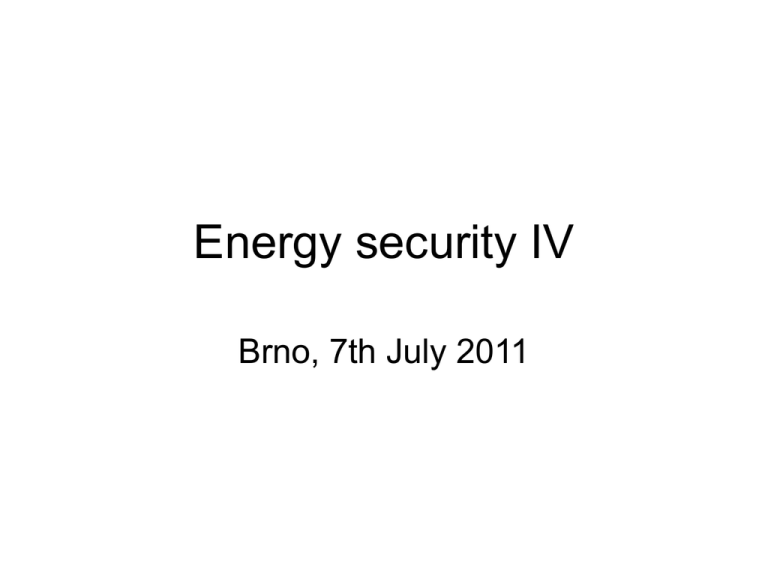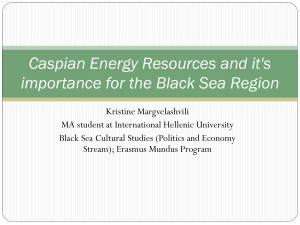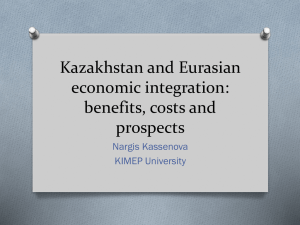Energy security IV
advertisement

Energy security IV Brno, 7th July 2011 Energy Strategy of the Russian Federation by 2030 • Published in 2009 • Reduction of Russian dependence on European markets planned in long-time perspective • Plans to develop Asia-Pacific dimension of Russian external energy policy (esp.Russian oil export to China – 1/3 of Russian oil exports in the future should be delivered to China) • Plans to join global LNG market • Emphasis on key points of interest of Russian energy policy (Caspian Sea and Arctic Circle – searching for new resources to fulfill all the projects of Russian energy companies) • More emphasis on energy effectivity – 2009: new legislation concerning energy savings and effectivity X • In reality: European dimension of Russian energy policy is still planned to be priority, Russian efforts to persist as the main actor in European market with energy resources Russian activities in Asia • China BRIC – possible economic cooperation? Oil: Rosneft – Sinopec: project Sakhalin 3 Vostok Energy: joint venture (Rosneft-CNPC) Pipeline to Nakhodka and to Daquing on Chinese side (Transneft company), connection of both lines – oil for China and Japan and South Korea possibly Gaz – Gazprom´s plans of a pipeline (from Yamal, supposed to be finished in 2011, complications) X 2009 – gas pipeline from Turkmenistan through Uzbekistan and Kazakhstan to Xinjiang Russian activities in Asia • Japan Still no treaty about normalisation of relations after WWII, territorial dispute concerning Kurill Islands persist (economic and geopolitical importance – fisheries, port in Etorofu Island) 1993 – joint declaration about mutual relations (esp.economic cooperation) Japan participation at Blue Stream project, problems in Sakhalin (2006 Gazprom made Schell, Mitsui and Mitsubishi to sell half of their share on Sakhalin I and II projects – Gazprom gained majority) X after crisis renewed Russian interest to gain Japan investments back Since 2009 deliveries of LNG from Sakhalin to Japan 2009 – series of agreements (Russian nuclear fuel to Japan in change for moder technologies) Joint agreement about exploitation of oil deposits in Eastern Siberia Russian activities in Asia • South Korea Since 1990 diplomatic relations, no border disputes, 2006-2007 first LNG from Gazprom • Vietnam Vietsovpetro – joint venture of Zarubezhneft and Petrovietnam (since January 2011 majority share of Vietnam company) Gazprom´s plans to invest to the development of oil and gas depostits at Bay of Bengal Russian activities in Asia • India 2000 Declaration of strategic partnership Offer to build „strategic triangle“ Cooperation in nuclear energy (Medvedev´s visit in Delhi 2008) Indian state company ONGC gained a share in Sakhalin´s project Russian activities in Middle East and North Africa • Quatar – possible cooperation between Russia, Quatar and Iran? • Algeria Memorandum of understanding between Gazprom and Sonatrach company GECF Trans-Saharan gas pipeline • Egypt Lukoil (Meleiha oil field), Novatek (El Arish deposits – Sinai peninsula), efforts of Gazprom (exploration and production in Egyptian deposits, interest in LNG facility Damietta, in cooperation with Eni) Kremlin – declaration of interest of Gazprom to enter through Stroytransgaz the project of Pan-Arab Pipeline Russian activities in Middle East and North Africa • Nigeria Growing interest of Russian companies NIGAZ (2009, Gazprom 50%, NNPC 50%, building of refineries, pipelines, gas power plants, problems with insolvency of NNPC) Trans-Saharan gas pipeline? Rosatom Itera + Indian Sun Energy Ltd. = Suntera ASEN – gas power plant with Russian technology • Iran Gas cartel? Cooperation in South Pars – Memorandum of understanding between Gazprom and NIOC – no practical results • Libya Cooperation of Gazprom with Eni and BASF Project El Feel, Marsa El Brega, 2nd line of Green Stream? Russia in Caspian region Caspic region in Russian energy policy • Efforts to keep control especially of the transport of Central Asian oil and gas • Energy resources from Caspian region have been used as additional resource for Russian domestic market and for export to certain external markets (esp.gas) • In the past – possibility to buy cheaper gas there X recent changes – in spite of them Gazprom keeps interest in long-time contracts here • In comparative perspective: Russia keeps relatively good position in relation to Kazakhstan X Azerbaijan among the first newly independent countries that began active cooperation with Western investors, Turkmenistan – efforts for diversification in recent years Dispute concerning legal status of Caspian Sea • Has not been fully solved yet – one of the major obstacles for the alternative of Trans-Caspian pipeline (for deliveries to the West) • In case of division of the seabed in national sectors Kazakhstan and Azerbaijand would have benefited most (less Russia, Turkmenistan and Iran) = influence on the different positions of the states • Russia – prefered „condominium“ principle and common exploitation of the seabed, estabilishment of regional organisation coordinating the cooperation and of common enterprise for exploration and extraction of the deposits, keeping of the principles of old Soviet-Iranian agreement on free navigation and fisheries except for the coastal line Dispute concerning legal status of Caspian Sea • Azerbaijan – began with extraction, significant deposits near Azerbaijani coastal line, Arezbaijan prefered quick resolution of the problem and division into national sectors under full jurisdiction of particular states • Turkmenistan – unclear position, balancing between support of „condominium“ and division into national sectors • Kazakhstan – compromise (division of the seabed and resources, estabilishment of fisheries zones, rest of the sea was supposed to be open for free navigation of merchant vessels of littoral states) Dispute concerning legal status of Caspian Sea • 1998 – dispute solved between Russia and Kazakhstan: legal status of sea – division of the northern part of the Caspian seabed according to international law, modification of the dividing line (concession to Russia) • Agreement cocncerning division of the part of Caspian Sea signed also by Azerbaijan • Kazakhstan 27%, Russia 20%, Azerbaijan – more than 18% X different postions of Iran and Turkmenistan (prez.Berdymukhamedov turned to UN to supervise the creation of legal document safeguarding stable and reliable supplies of energy resources from Caspian Sea) Turkmenistan • Biggest gas producer in Central Asia • Supposed 4th largest world natural gas deposits • Goal declared to increase the extraction significantly by 2030 – necessity of investments to extraction and transport infrastructure • One of the largest world gas deposits – South Yoleten (2009 – contract for development of the deposit assigned to consortium of companies from China, South Korea and UEA) • First LNG terminal in Caspian area • Offshore projects – still influenced with the dispute with Azerbaijan concerning the sea border • Onshore projects – oil and gas deposits in central and eastern part of Turkmenistan Turkmenistan • Important role of government concerning management of natural recources – State agency for management and exploitation of hydrocarbons, subordinated to the president of Turkmenistan • State company Turkmengaz – gas distribution in Turkmenistan • State rafinery TKNPZ, construction company Turkmenneftgazstroy • State-owned gas pipeline network including export infrastructure X exception – gas pipeline to China – on the basis of international contract • Gas subsidised for domestic consumers Turkmenistan – transport infrastructure (cooperation with Russia) • In Soviet era – supplies to Russia • By 2009 – regular supplies of 40-45 bcm/y of gas to Gazprom X 2009 – explosion of the 4th line of Central Asian pipeline (CAC) = sharp decline of the deliveries to Russia • Export of Turkmen gas to Russia decreased from 70% of Turkmen production to 45% • Consolidation of the situation – beginning of 2010 X original volumes of deliveries were not re-estabilished • Russia aimed to increase import of Turkmen gas again (Russian-Turkmen summit in November 2010) X paralel Turkmen negotiations about alternative projects (e.g.Nabucco), plans to increase domestic consumption Turkmenistan – transport infrastructure (cooperation with Russia) • Pri-Caspian (Caspian Coastal) pipeline 2007 – agreement Turkmenistan – Kazakhstan – Russia, northern „circumvention“ of Caspian Sea – delayed, suspended • 2010 – East-West connection between deposits in the East and the coast of Caspic Sea, originally international project x Turkmenistan had decided for discrete building of the pipeline, but then offered to Russian company Itera the possibility to build part of the line Turkmenistan – transport infrastructure (diversification) • 2010 – gas pipeline from eastern part of Turkmenistan to China via Uzbekistan • Pipeline Turkmenistan – Iran • Support of Turkmenistan for possible building of gas pipeline TAPI (to Pakistan and India via Afghanistan) • Possible participation of Turkmenistan in Nabucco? (problem with project of TransCaspian pipeline) Kazakhstan • Strong position of national company KazMunaiGaz • Important oil deposits: Tengiz, Kashagan, Karachaganak, Korolevskoye,... • Plans to increase export by 2015 • Deposits of natural gas - shelf of Caspian Sea, onshore deposits in Western part of the country (Karachaganak, Tengiz, Kashagan) – 2% of world deposits X import of gas from Russia and Uzbekistan • Effort to get rid of import dependency and increase extraction by 2015 • Need of better infrastructure to supply domestic consumers with gas Kazakhstan – foreign investments • American companies - Chevroil, ExxonMobil (esp.oil), Texaco • ENI (Italy) • Shell, Total • But also Mittal Energy, Sinopec and CNPC • Russian investments Esp.Lukoil (Tengiz, Karachaganak), joint ventures Gazprom – joint venture KazRosGas - Gazprom 50%; processing of gas and sales in Kazakh internal market and abroad) - gas is distributed to Russia to Orenburg refinery and sold by Russian companies to Eastern Europe (Baltic countries, Ukraine) or Turkey - Almost monopolist exporter of Kazakh gas and key player in internal market with gas Rosneft – subsidy RN-Kazakhstan Kazakhstan – export of resources • Transport of resources from Kazakhstan mainly through Russian territory and infrastructure • Oil System CPC (Caspian Pipeline Consortium) – Transneft, KazMunaiGaz, Chevron, Rosněfť, ENI...; from Tengiz to Russian port Novorossijsk (possibly through Burgas – Alexandropolis) Atyrau – Samara (to Eastern Europe through BPS, Druzhba, Black Sea ports) Transport from port Aktau – either railway transport and usage of Russian pipelines (Transneft) or even possible transport through Baku – Tbilisi – Ceyhan (diversification, Trans-Caspian system) Kazakhstan – export of resources • Oil – diversification 2006 – celebration of opening of Atasu – Alashankou (also possibility to transport Russian oil to China in this way) Plans to build 2nd line of Kazakhstan-China pipeline • Gas Kazakhstan rather transit state (for gas from other Central Asian countries), import of gas from Uzbekistan, transport network needs modernisation Central Asia – Centre gas pipeline system: built in Soviet era (1960´s), gas from Uzbekistan, Turkmenistan and Western Kazakhstan, joined with Gazprom transport system and transported to CIS and Europe Kazakhstan – gas pipelines II • Kazakhstan – China pipeline: part of Central Asia-China pipeline, Turkmen gas is delivered from the UzbekKazakh border to China (2 lines: 1. Turkmen gas; 2. sources from W Kazakhstan) • Project of Pri-Caspian (Caspían Coastal) pipeline: Turkmenistan-Kazakhstan-Russia: supposed to join Central Asia-Centre pipeline (alternative to projects that circumvent Russian territory – BTE, Nabucco) • Project of Trans-Caspian pipeline Aktau-Baku (through Caspian Sea, joining Baku-Tbilisi-Erzurum and possibly Nabucco X unsolved problem of the status of Caspian Sea) Azerbaijan and South Caucasus • The most important oil pipeline delivering oil to Europe and circumventing Russian territory is BTC – second longest oil pipeline after Druzhba • Oil pipeline Baku – Supsa (former part of Soviet pipeline system, now operated by ExxonMobile) • Baku-Novorossijsk (with Russian Transneft) – originally through Chechen territory, 2000 – circumvention through Dagestan • Railway transport of oil Azerbaijan – gas pipelines • Gas pipeline Baku – Tbilisi – Erzurum: almost the same route 2007, gas from big Azerbaijani deposit Shah Deniz to Georgia and Turkey (one of the supposed bases for Caspian gas deliveries into Europe) • Project Nabucco – agreement about gas deliveries for Nabucco was signed in Baku in January 2011 (obligation to deliver „substantial volume of gas“ necessary for „Southern corridor“ building X 2009 Azerbaijani president Aliyev signed agreement with Russia about gas deliveries – doubts about impacts on Nabucco project Energy and geopolitics of South Caucasus • Importance of Georgia as transit state for both oil and gas, storage capacities • Black Sea: Kulevi terminal, Batumi port • During Russian-Georgian war 2008 ports that play important role in railway transport of oil were damaged as well as Baku-Supsa oil pipeline and railway routes; partial stop of BTE operation and of extraction in Azerbaijani oil fields X Peripherial position of Armenia – problem of diversification of resource deliveries was not solved (originally Armenia was offered to take part at oil pipeline from Azerbaijan X conditioned by evacuation of Armenian troops from the disputed area of Nagorny Karabakh) • Cooperation Armenia – Iran (oil, gas pipelines) • Metsamor nuclear power plant (possible danger – seismically active zone)









